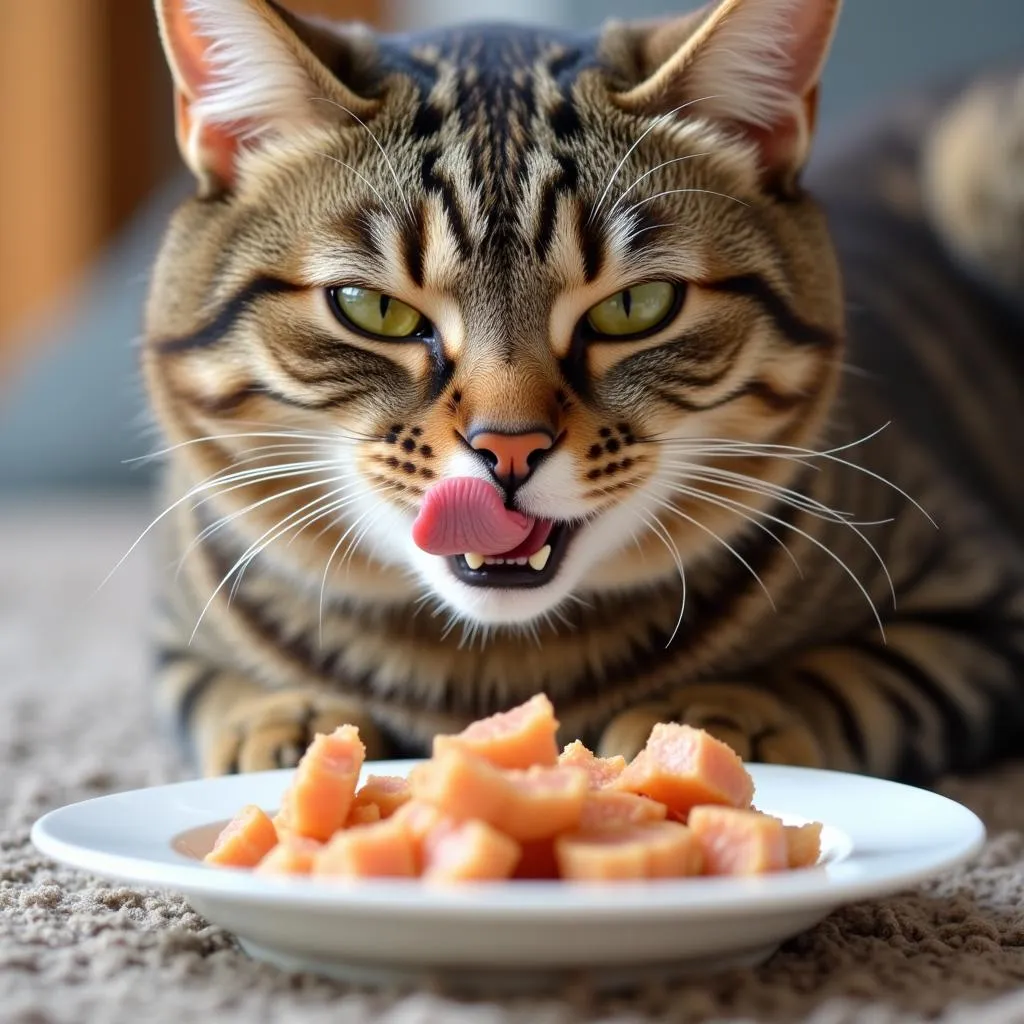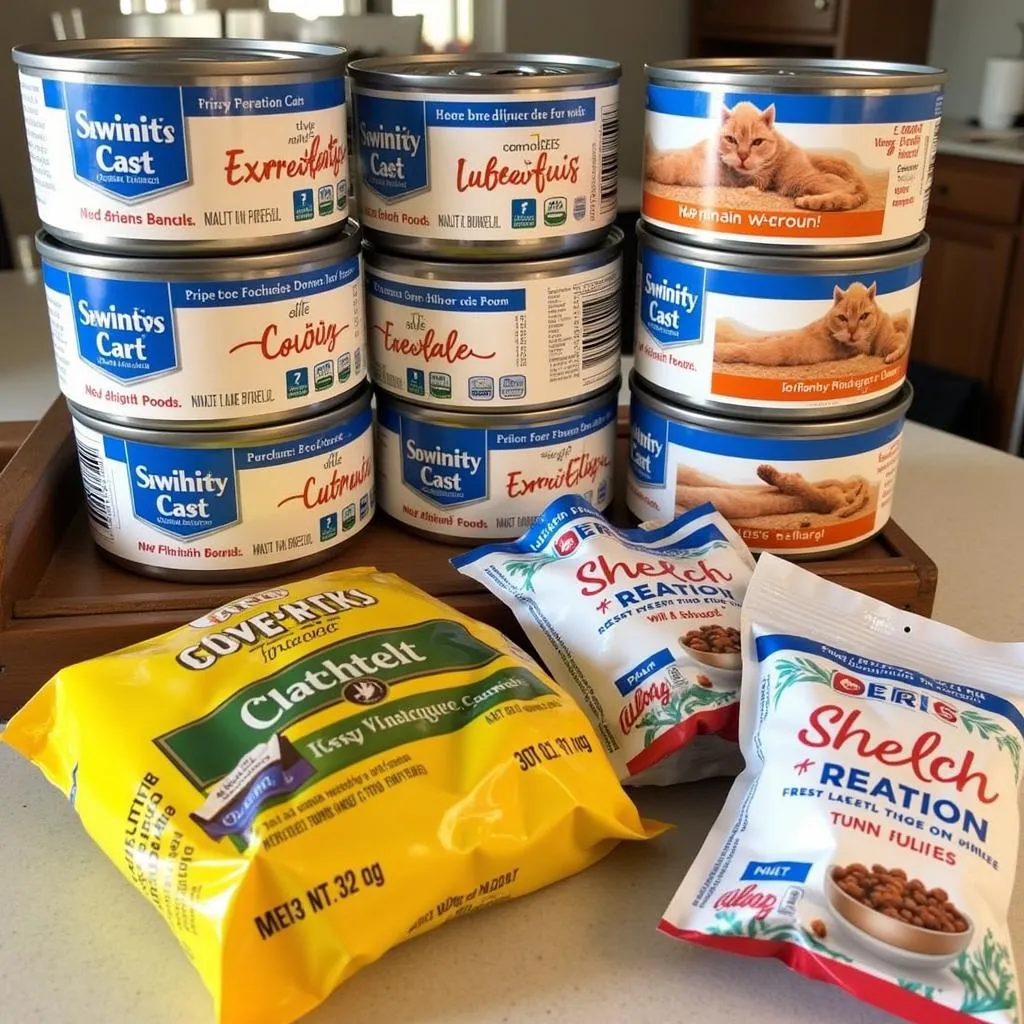Cat Food Tuna is a popular choice for pet owners, and it’s easy to see why. Tuna has a strong aroma that entices cats, and it’s a good source of protein. But is cat food tuna really good for your feline friend?
This comprehensive guide will delve into the world of cat food tuna, exploring its benefits, risks, and everything in between. We’ll discuss the nutritional value of tuna, the different types of cat food tuna available, and how to choose the best option for your cat. You’ll also learn about potential health concerns, safe feeding practices, and how to create a balanced diet that keeps your cat happy and healthy.
The Appeal of Tuna for Cats: Why Do They Love It?
Cats are obligate carnivores, meaning they require meat-based diets to thrive. Tuna, being a rich source of protein, naturally appeals to their carnivorous instincts. The strong, savory scent of tuna is highly attractive to cats, often making mealtime more enticing.
 Cat Enjoying Tuna Meal
Cat Enjoying Tuna Meal
However, while the occasional treat of tuna might seem harmless, it’s essential to understand the nutritional nuances and potential risks associated with a tuna-heavy diet for your feline companion.
Nutritional Value of Tuna: What Does it Offer Your Cat?
Tuna can be a source of essential nutrients for cats, including:
- Protein: Essential for muscle development, tissue repair, and overall growth.
- Omega-3 Fatty Acids: Support cognitive function, heart health, and reduce inflammation.
- Vitamins and Minerals: Tuna contains various vitamins and minerals like vitamin D, selenium, and potassium, which contribute to overall health.
However, tuna alone cannot provide all the nutrients a cat needs. Feeding your cat a diet solely based on tuna can lead to nutritional deficiencies.
Types of Cat Food Tuna: Navigating the Options
When choosing cat food tuna, you’ll encounter various options:
- Wet Food: This type typically contains chunks or flakes of tuna in gravy or jelly. While palatable, it can be high in moisture content.
- Dry Food: Dry cat food often incorporates tuna meal, a concentrated form of tuna. It’s less appealing to some cats due to its drier texture.
- Tuna Treats: These come in various forms, like flakes, pouches, or even dental chews. While tasty, they should be given in moderation.
Choosing the Right Cat Food Tuna: Factors to Consider
Selecting the best cat food tuna involves considering several factors:
- Life Stage: Kittens, adults, and senior cats have different nutritional needs. Choose a formula specifically designed for your cat’s life stage.
- Health Conditions: If your cat has any health issues, such as food allergies or sensitivities, consult your veterinarian for recommendations.
- Ingredients: Look for high-quality ingredients, with tuna listed as the primary ingredient. Avoid artificial colors, flavors, and preservatives.
“Always prioritize your cat’s overall health,” advises Dr. Sarah Williams, a veterinarian with over 15 years of experience. “A balanced diet is crucial, and while tuna can be a part of it, it shouldn’t be the sole source of nutrition.”
Potential Health Risks of Tuna: What to Watch Out For
While tuna can be a part of a healthy diet for cats, there are potential health risks associated with excessive consumption:
- Mercury Poisoning: Tuna, especially larger species, can accumulate mercury. High levels of mercury can lead to neurological problems in cats.
- Thiamine Deficiency: Tuna contains an enzyme called thiaminase, which can break down thiamine (vitamin B1). Thiamine deficiency can cause serious health issues.
- Obesity: Tuna, especially when given as a treat, can contribute to weight gain if not carefully monitored.
Safe Feeding Practices: Moderation is Key
- Treat in Moderation: Tuna should be given as an occasional treat, not as a staple diet.
- Choose the Right Type: Opt for tuna packed in water rather than oil, as it’s lower in calories and fat.
- Variety is Vital: Offer a variety of protein sources in your cat’s diet, including chicken, fish, and beef.
 Variety of Cat Food Options
Variety of Cat Food Options
By following these guidelines, you can safely incorporate tuna into your cat’s diet while minimizing potential health risks.
Cat Food Tuna and Special Diets: Considerations and Alternatives
If your cat has specific dietary needs, such as allergies or sensitivities, finding suitable cat food options can be challenging.
- Alternatives to Tuna: Consider other protein sources like salmon, chicken, or turkey.
- Hydrolyzed Protein Diets: For cats with severe food allergies, hydrolyzed protein diets break down proteins into smaller particles, reducing the risk of allergic reactions.
- Consult Your Veterinarian: Always consult with your veterinarian to determine the best dietary approach for your cat’s individual needs.
Conclusion: Striking a Balance with Cat Food Tuna
Cat food tuna can be a healthy and enjoyable addition to your cat’s diet when offered in moderation and as part of a balanced meal plan. By understanding the nutritional benefits, potential risks, and safe feeding practices, you can make informed decisions about incorporating tuna into your cat’s diet. Remember to consult your veterinarian to ensure you’re meeting your cat’s individual needs and keeping them happy, healthy, and purring with delight.
Frequently Asked Questions:
- Can I feed my cat tuna every day? No, feeding tuna daily is not recommended due to the risks of mercury poisoning, thiamine deficiency, and potential weight gain.
- What type of tuna is best for cats? Tuna packed in water is a healthier choice than tuna packed in oil.
- How much tuna can I give my cat? Tuna should be given as an occasional treat, not as a meal replacement. The amount will vary depending on your cat’s size and activity level.
- Can kittens eat tuna? It’s best to consult your veterinarian about feeding tuna to kittens, as their nutritional needs are different from adult cats.
- What are some signs of mercury poisoning in cats? Signs of mercury poisoning in cats can include loss of coordination, tremors, blindness, and behavioral changes. If you notice any of these signs, contact your veterinarian immediately.
Need more information about cat food? Check out these related articles:
- Cat Food Paws: Explore a variety of cat food options designed to provide essential nutrients for your feline friend.
- Difference Between Food Pantry and Food Bank: Learn about resources available for pet owners facing financial hardship and needing assistance with pet food.
For personalized advice and support regarding your cat’s diet, contact Mina Cones Food at:
Phone: 02437655121
Email: minacones@gmail.com
Address: 3PGH+8R9, ĐT70A, thôn Trung, Bắc Từ Liêm, Hà Nội, Việt Nam
Our dedicated team is available 24/7 to assist you with any questions or concerns you may have.